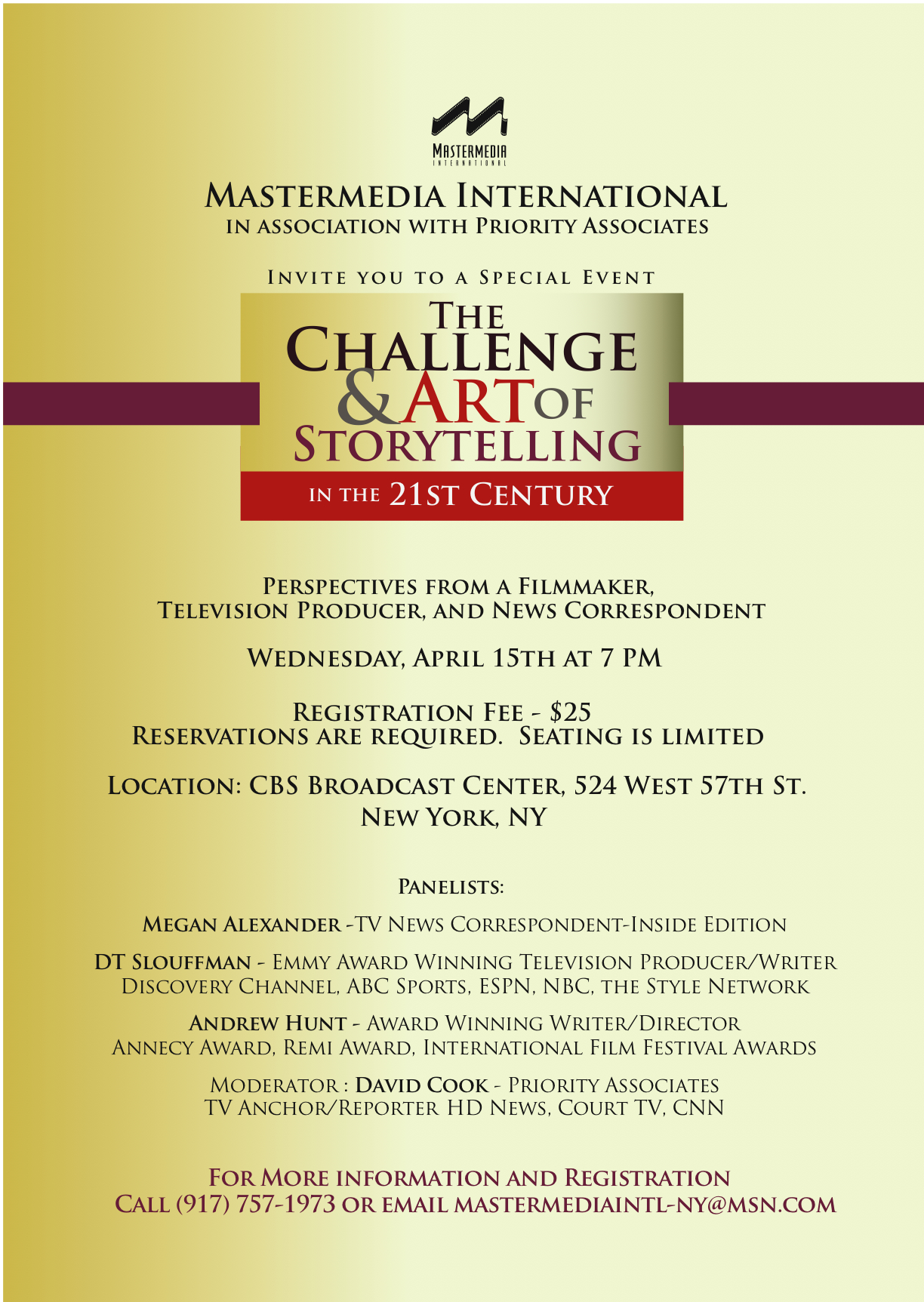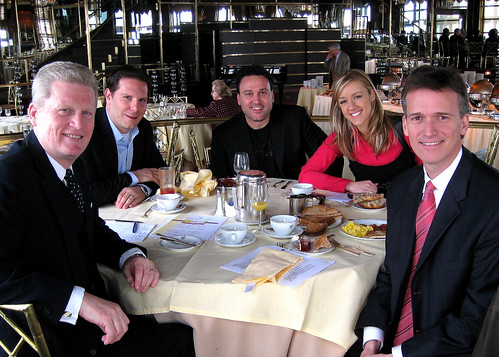The Love Game wins!
Viewing entries tagged
director
I've been invited to take part in a panel with Megan Alexander - Correspondent with Inside Edition and D.T. Slouffman - Emmy winning TV Producer. The subject is the Art & Challenge of Storytelling in the 21st Century and it's being held on April 15 at CBS.
We met in the Rainbow Room at NBC for breakfast and enjoyed the stunning views of Manhattan as we discussed our plans for the forum.
I shall include a copy of the invitation for those interested in coming below.

I gave a lecture on Monday at NYCAM where the students are a mixture of fine artists, writers and new media artists. This definitely changed the way I prepared the lecture. I found myself more inclined to find universal connecting points between the various disciplines and so I spoke about how story is central to all the arts and the role the arts play in "cultural renewal." As artists and therefore storytellers, we are all engaged in some form of cultural renewal shaped by the way we see the world. Tim Keller - best selling author and authority on J.R.R Tolkien - was giving a lecture about Tolkien during which he talked about how Tolkien's personal worldview influenced the kind of stories he told. Keller prefaced it by defining cultural renewal this way:
"Every artist is doing cultural renewal. Every artist has some theory about what's wrong with things and what would put them right or righter. I mean if you really think that things are just broken and nothing will ever put them right then it's a dark vision but that's your working theory. If you think that things are bad but the world's an illusion then that's your working theory... every artist is trying to move the onlookers, the hearers, in a direction - some more subtly than others - but everyone is doing cultural renewal."
Mike Myers, during his interview on the Actor's Studio, expressed his worldview by stating that he is "obsessed with movies being a transformation of consciousness machine, that that is what you pay the money for: the fantasy that within 90 minutes somebody could have one indelible belief system that seems to give them identity and by the end they put that onto the sacrificial altar and believe in a completely different reality and whether that's done with broad comedy or if it's done with 'high drama' doesn't matter to me."
Tolkien had a theory about art that was integrated with his deepest beliefs, with his own worldview and I think you can see that - not just in Tolkien's work - but in every movie you see or book you read, or album you listen to and so on. I often find that the really good storytellers are articulate about their own working theory of art and they posses a deep understanding and respect for the audience their work touches.
This is what makes James L. Brooks such a great writer; he knows who he is as a storyteller, he understands his audience and how to connect to them and this imbues the way he engages in cultural renewal. The result is that even in simple films like Spanglish he is able to make a connection between the audience and his characters that is so deep because we see our own humanity in them.
So if we are all engaged in cultural renewal then it makes sense to ask ourselves: what is our working theory of art? what is our worldview? and to what degree do we know our audience? The answers can only make us better storytellers.
I was a guest lecturer at NYU's Tisch film program in New York city today and was impressed both with the facilities and the students. They say you can judge a lot about a Film School by the quality of its output and there's no doubt that the Tisch Film program deserves it's fine reputation. The students I worked with that day were immensely talented, passionate about story and brimming with intelligence.
I was invited to lecture there by Professor David Zung who is himself a working storyboard artist of the highest caliber not to mention a deeply gifted artist. We had hired David on a project last year and it was the best director/storyboard artist relationship I had ever encountered. On reflection I believe this was in some part because David and I see story the same way but it was in large part to David's remarkable humility as an artist. There are far too many egos in our industry and it was refreshing to work with someone who brought such passion and talent to the project.
The lecture was three hours long, the first half of which consisted of working one on one with the students going over storyboards they had done for their film projects and the remaining half was the lecture I gave entitled: "The Director's Vision - Creating and Sharing your Vision to Cast and Crew."
As part of the lecture we deconstructed the films "American Beauty" and "In the Mood for Love" and then ended with an exercise from one of my recent films "The Accidental Activist." I gave the students the script of the film's opening scene and then asked them to storyboard it. I then asked them to figure out how to shoot what they had storyboarded. It was, at times, a comic reminder of how differently a script can be visually interpreted and at the same time underscored some of the challenges involved in visualizing the written word.
All in all it was a great day and I left looking forward to seeing how their films turn out. If it's anything like the school I'm sure they will be brilliant.


